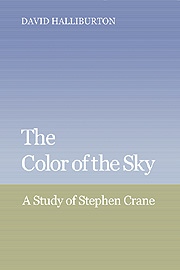Book contents
- Frontmatter
- Contents
- 1 Introduction
- 2 The Little: Early Writings
- 3 Conflict as Condition: Maggie: A Girl of the Streets
- 4 Doing Without: George's Mother
- 5 Eternal Fact and Mere Locality: The Red Badge of Courage: An Episode of the American Civil War
- 6 The Mysteries of Heroism and the Aesthetics of War: Army Tales and Other War Writings
- 7 Community and Crisis: “The Monster,” Tales of Whilomville, “The Blue Hotel,” “The Bride Comes to Yellow Sky”
- 8 The Ethics of Their Condition and the Unreal Real: “The Open Boat,” “The Five White Mice”
- 9 The Farther Shore: Poems
- Notes
- Index
7 - Community and Crisis: “The Monster,” Tales of Whilomville, “The Blue Hotel,” “The Bride Comes to Yellow Sky”
Published online by Cambridge University Press: 06 July 2010
- Frontmatter
- Contents
- 1 Introduction
- 2 The Little: Early Writings
- 3 Conflict as Condition: Maggie: A Girl of the Streets
- 4 Doing Without: George's Mother
- 5 Eternal Fact and Mere Locality: The Red Badge of Courage: An Episode of the American Civil War
- 6 The Mysteries of Heroism and the Aesthetics of War: Army Tales and Other War Writings
- 7 Community and Crisis: “The Monster,” Tales of Whilomville, “The Blue Hotel,” “The Bride Comes to Yellow Sky”
- 8 The Ethics of Their Condition and the Unreal Real: “The Open Boat,” “The Five White Mice”
- 9 The Farther Shore: Poems
- Notes
- Index
Summary
In Crane's slum novels the primary community facing crisis is the nuclear family; the nuclear family also plays a role in The Third Violet and Active Service. Family relations are so interwoven with relations to a larger community, in each of these works, that is is hard to say where one set ends and another begins. The same applies to the works in this chapter, “The Monster,” “The Blue Hotel,” “The Bride Comes to Yellow Sky,” and Tales of Whilomville. In the first, the rescue of an only child leads to disruptions affecting not merely the family but the entire neighboring population. The second work turns largely on the manner in which a father and son deal with one stranger who is difficult and another who is diffident. In the third work the family, in the form of the newlywed couple, comes into being in a way that will alter forever the community that has existed up till now. Finally, Tales of Whilomville portrays crises not only within particular families but within communities of peers who are mainly children and mainly males. In all these respects the writings considered here differ from a number of other works in which crises are experienced by spontaneous, small, and temporary groups in a way that directly addresses the question of fraternity.
“Now, ‘The Blue Hotel’ goes in neatly with ‘The Monster’ and together they make 32,000” (Letters, p. 172).
- Type
- Chapter
- Information
- The Color of the SkyA Study of Stephen Crane, pp. 182 - 235Publisher: Cambridge University PressPrint publication year: 1989



